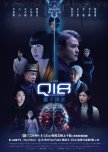An impressive work, from start to finish
I’m not sure if I’ve recently become somewhat partial to Taiwan, but what their creators and actors deliver is simply incredible.
I haven’t seen many sci-fi series with an LGBTQ theme—mostly just fantasy or mystery—so in terms of the sci-fi genre, this is one of the very few projects I’ve watched. I was delighted to see a few familiar faces in both the main and supporting roles, and all the actors were likable and delivered truly outstanding performances.
From the beginning, this series sets a serious tone about life and the impact of technology on our world. The main storyline is interwoven with other related events in each episode.
The main plot follows a boy named Kuang (Hsiu Fu Liu), who suffers from ALS (Amyotrophic Lateral Sclerosis). His father, Dr. Ke, creates two quantum AIs for him to help him explore the world: Black, an AI that uses quantum computing (played by Aaron Yan), and White, an AI that uses quantum sensors (played by Shih Chih Tian). (Black and White—one is quick, precise, and more practical, while the other is more sensitive to detail and perceptive. I would almost compare them to the brain and the heart.) With them, we observe how they learn to recognize, understand, and perceive emotions, love, life, and death. In this sense, it’s sometimes quite charming how they "send and receive electronic signals" (love), and both are wonderful—I think everyone will like them.
Besides that, the series also tackles significant social questions and issues throughout. I’ll list a few because they’re on my mind now after watching it.
• How long could you bear to watch someone close to you age, decline, but be unable to die? Is that still life for that person? How can illness influence the will to live?
• Would you want to perceive your partner as they were when you first fell in love? Would that sense of false happiness still matter after years? And is it even false happiness if we once felt it but later forget it?
• Is it wise to place technology above all else? But is it also good not to use it at all? Isn’t balance the way forward?
• Can you, as a parent, make decisions for your child out of so-called love without their knowledge? Isn’t it merely an act of selfishness—aren't parents doing it just for themselves?
• Can we be completely happy in a world we’ve created ourselves? Can reality eventually catch up to us? Can we make decisions for others?
As I wrote above, this series raises many questions and touches on a lot of serious topics. I believe it won’t let anyone watch without reflecting. It strikes at one’s emotions because, even though none of this can happen right now, the stories resonate with every era and individual in their own way. At times, it was very intense, especially when Kuang finally learns the truth in episode 6—and the way it’s done… it must be a horrible feeling.
The series includes many beautifully cinematic scenes, pleasant music, and moves quickly. The creators did a good job of portraying both the future world and the virtual world. I don’t want to look for any flaws because nothing distracted me. I didn’t find a single moment that felt dull, and I always needed to watch the next episode immediately.
I would say I’d recommend it to everyone, but honestly, I don’t know if it’s for everyone. It’s a bit more complex, intelligent, and thought-provoking. It’s not something to watch if you just want to relax or zone out, but I know for sure that I’ll want to see it again.
I haven’t seen many sci-fi series with an LGBTQ theme—mostly just fantasy or mystery—so in terms of the sci-fi genre, this is one of the very few projects I’ve watched. I was delighted to see a few familiar faces in both the main and supporting roles, and all the actors were likable and delivered truly outstanding performances.
From the beginning, this series sets a serious tone about life and the impact of technology on our world. The main storyline is interwoven with other related events in each episode.
The main plot follows a boy named Kuang (Hsiu Fu Liu), who suffers from ALS (Amyotrophic Lateral Sclerosis). His father, Dr. Ke, creates two quantum AIs for him to help him explore the world: Black, an AI that uses quantum computing (played by Aaron Yan), and White, an AI that uses quantum sensors (played by Shih Chih Tian). (Black and White—one is quick, precise, and more practical, while the other is more sensitive to detail and perceptive. I would almost compare them to the brain and the heart.) With them, we observe how they learn to recognize, understand, and perceive emotions, love, life, and death. In this sense, it’s sometimes quite charming how they "send and receive electronic signals" (love), and both are wonderful—I think everyone will like them.
Besides that, the series also tackles significant social questions and issues throughout. I’ll list a few because they’re on my mind now after watching it.
• How long could you bear to watch someone close to you age, decline, but be unable to die? Is that still life for that person? How can illness influence the will to live?
• Would you want to perceive your partner as they were when you first fell in love? Would that sense of false happiness still matter after years? And is it even false happiness if we once felt it but later forget it?
• Is it wise to place technology above all else? But is it also good not to use it at all? Isn’t balance the way forward?
• Can you, as a parent, make decisions for your child out of so-called love without their knowledge? Isn’t it merely an act of selfishness—aren't parents doing it just for themselves?
• Can we be completely happy in a world we’ve created ourselves? Can reality eventually catch up to us? Can we make decisions for others?
As I wrote above, this series raises many questions and touches on a lot of serious topics. I believe it won’t let anyone watch without reflecting. It strikes at one’s emotions because, even though none of this can happen right now, the stories resonate with every era and individual in their own way. At times, it was very intense, especially when Kuang finally learns the truth in episode 6—and the way it’s done… it must be a horrible feeling.
The series includes many beautifully cinematic scenes, pleasant music, and moves quickly. The creators did a good job of portraying both the future world and the virtual world. I don’t want to look for any flaws because nothing distracted me. I didn’t find a single moment that felt dull, and I always needed to watch the next episode immediately.
I would say I’d recommend it to everyone, but honestly, I don’t know if it’s for everyone. It’s a bit more complex, intelligent, and thought-provoking. It’s not something to watch if you just want to relax or zone out, but I know for sure that I’ll want to see it again.
Was this review helpful to you?





